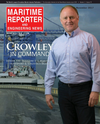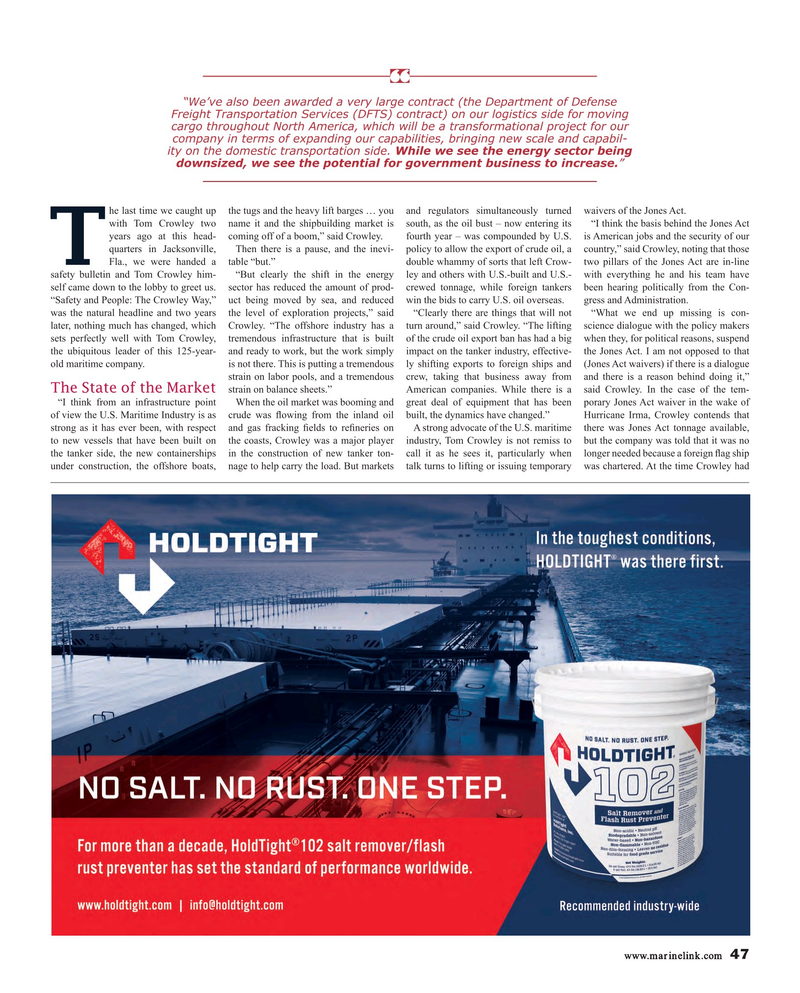
Page 47: of Maritime Reporter Magazine (November 2017)
The Workboat Edition
Read this page in Pdf, Flash or Html5 edition of November 2017 Maritime Reporter Magazine
“ “We’ve also been awarded a very large contract (the Department of Defense
Freight Transportation Services (DFTS) contract) on our logistics side for moving cargo throughout North America, which will be a transformational project for our company in terms of expanding our capabilities, bringing new scale and capabil- ity on the domestic transportation side. While we see the energy sector being downsized, we see the potential for government business to increase.” he last time we caught up the tugs and the heavy lift barges … you and regulators simultaneously turned waivers of the Jones Act.
with Tom Crowley two name it and the shipbuilding market is south, as the oil bust – now entering its “I think the basis behind the Jones Act years ago at this head- coming off of a boom,” said Crowley. fourth year – was compounded by U.S. is American jobs and the security of our quarters in Jacksonville, Then there is a pause, and the inevi- policy to allow the export of crude oil, a country,” said Crowley, noting that those
T Fla., we were handed a table “but.” double whammy of sorts that left Crow- two pillars of the Jones Act are in-line safety bulletin and Tom Crowley him- “But clearly the shift in the energy ley and others with U.S.-built and U.S.- with everything he and his team have self came down to the lobby to greet us. sector has reduced the amount of prod- crewed tonnage, while foreign tankers been hearing politically from the Con- “Safety and People: The Crowley Way,” uct being moved by sea, and reduced win the bids to carry U.S. oil overseas. gress and Administration. was the natural headline and two years the level of exploration projects,” said “Clearly there are things that will not “What we end up missing is con- later, nothing much has changed, which Crowley. “The offshore industry has a turn around,” said Crowley. “The lifting science dialogue with the policy makers sets perfectly well with Tom Crowley, tremendous infrastructure that is built of the crude oil export ban has had a big when they, for political reasons, suspend the ubiquitous leader of this 125-year- and ready to work, but the work simply impact on the tanker industry, effective- the Jones Act. I am not opposed to that old maritime company. is not there. This is putting a tremendous ly shifting exports to foreign ships and (Jones Act waivers) if there is a dialogue strain on labor pools, and a tremendous crew, taking that business away from and there is a reason behind doing it,” strain on balance sheets.” American companies. While there is a said Crowley. In the case of the tem-
The State of the Market “I think from an infrastructure point When the oil market was booming and great deal of equipment that has been porary Jones Act waiver in the wake of of view the U.S. Maritime Industry is as crude was ? owing from the inland oil built, the dynamics have changed.” Hurricane Irma, Crowley contends that strong as it has ever been, with respect and gas fracking ? elds to re? neries on A strong advocate of the U.S. maritime there was Jones Act tonnage available, to new vessels that have been built on the coasts, Crowley was a major player industry, Tom Crowley is not remiss to but the company was told that it was no the tanker side, the new containerships in the construction of new tanker ton- call it as he sees it, particularly when longer needed because a foreign ? ag ship under construction, the offshore boats, nage to help carry the load. But markets talk turns to lifting or issuing temporary was chartered. At the time Crowley had www.marinelink.com 47
MR #11 (42-49).indd 47 MR #11 (42-49).indd 47 11/6/2017 3:27:03 PM11/6/2017 3:27:03 PM

 46
46

 48
48
